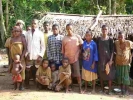 Its lower cost has made it popular in commercial food and cosmetics production, but after having caused massive deforestation in Southeast Asia, palm oil plantations are now getting a similar rap in Africa. Oil palm plantations are rapidly expanding in Gabon, Cameroon and the Congo Basin. Gabon - where forest covers still 80 percent of the territory - is feeling the brunt.
Its lower cost has made it popular in commercial food and cosmetics production, but after having caused massive deforestation in Southeast Asia, palm oil plantations are now getting a similar rap in Africa. Oil palm plantations are rapidly expanding in Gabon, Cameroon and the Congo Basin. Gabon - where forest covers still 80 percent of the territory - is feeling the brunt.
Brainforest and Mighty, two environmental groups, investigated the activities of Olam, an agri-business giant with headquarter in Singapore, which has planted 58,000 hectares of palm trees in Gabon. "It is estimated that Olam has deforested 20,000 hectares in its Gabonese concessions of Awala et Mouila since 2012," the groups said in a report released in mid-December. "Investigators on the scene witnessed and filmed bulldozers knocking down huge trees en masse."
Hearings in the case against Sustainable Oils Cameroon, formerly a subsidiary of American company Herakles Farms, were postponed after reports of unrest in the area in November.
Greenpeace has asked Cameroon not to renew the company's concession which expired at the end of November, and it cited "six years of illegal foresting, trampling of locals' rights, unfulfilled investments and destruction of forest".
A petition signed by 180,000 people against renewal of the contract was sent last week to Cameroon President Paul Biya, Greenpeace said.
The government has not yet made a decision but Greenpeace said it hoped it would hear the voices of "thousands of Cameroonians".
Meanwhile the plantations of Socapalm, a subsidiary of the Luxembourg company Socfin in which the family firm of French businessman Vincent Bollore owns a large minority stake, were targeted by protests in November. "No to pollution and massive environmental destruction" read one banner, while another urged the company to open a dialogue with residents. "More than 5,000 hectares has been used," a resident called Ebeneser Ekango told AFPTV at the time, complaining there wasn't enough land to plant the staple crop cassava. "What do we eat?” Greenpeace, which has complained that Socfin concessions have included old-growth forests, that now risk to be cleared.


